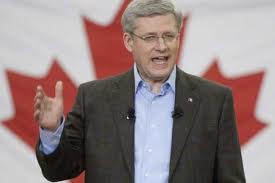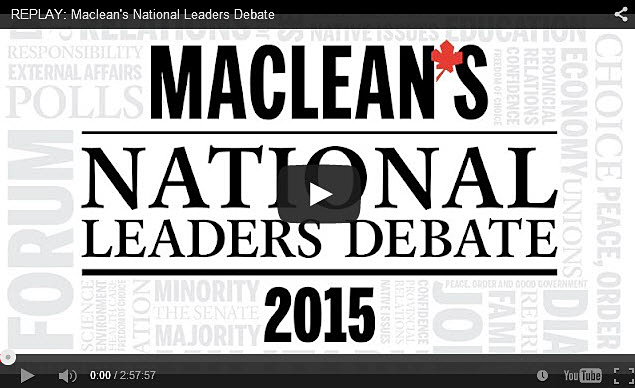Canada’s National Leaders Debate 2015. “Why Has the Standard of Living of Most Canadian Families Declined?”

Mr. Prime Minister, if “incomes have been growing in this country“, then why is the standard of living of most Canadian families declining?
I can tell you why. You and your government have deregulated the economy and have removed consumer protection mechanisms that used to ensure fair prices for acceptable quality of products and services.
As a result, the cost of living grows faster than the incomes. At the same time, the quality of available products and services is declining, as well.

Watch the full debate on YouTube: https://www.youtube.com/watch?v=hSf2__qpeGA
We have increasing monopolization of the markets and unprecedented price gouging in basic necessities, including food, clothing, fuel, housing, rent, insurance, and almost all other products and services offered in Canada today. The corporate priority is to maximize profits by increasing prices and lowering costs. Due to the lack of government regulations, this greed-driven process has gone too far. The only service that has become less expensive is a divorce, I wonder why?
We witness decreasing quality of services, including education, health care, social security programs, affordable housing, road repairs, protection of the environment, and the list goes on.
You have eased corporate taxes and international tariffs that allowed Canadians to benefit from their resources and their markets.
You (and Justin Trudeau) are now telling us that these measures are necessary to encourage investment. They are not. We want to live in a country where corporations serve the economy and the economy serves the people. It was once possible, why is it not possible now? Instead, we have a country in which people serve the economy and the economy serves the corporations.
Let them go, cut them loose. Do what a good government should do – manage the economy instead of making your job easier by contracting it out to the private sector without sufficient regulation and control. All will not leave Canada. Foreign markets are saturated, competition is tough.
You have privatized public property that belonged to all Canadians. Selling national resources and labour is a colonial model of economy.
You have reduced pollution by off-shoring our industries and jobs, but you forgot that pollution cannot be stopped by national borders. It spreads and it comes back to us, eventually.
You have dragged Canada into the U.S. illegal and criminal wars of conquest for energy resources and world domination, wars that were initiated on a pack of proven lies. Our military engagements abroad cost Canadians more than we can afford at this time. Your war mongering and your role in pushing the world toward a global military confrontation cannot be seen as good for Canada and Canadians.
Finally, in November of 2014, you have embarrassed us all by directing the Canadian Ambassador to the United Nations to vote against the UN Resolution Condemning the Glorification of Nazism – (HERE and HERE). Canada was one of only three countries that voted against it, the other two being the US and Ukraine.
Evaluation of the performance of the four leaders
1. Mr. Mulcair – Comprehensive and holistic approach to the issues involved. Good personal record and noticeable experience in governing at the provincial level. Nice touch on democracy, senate, and governing, but he blew it on foreign policy. Muclair is unable to see that Russia under Putin, unlike the US, EU, and Canada, supports international law and has not been engaging in aggressive wars. Russia helped secure the referendum in Crimea, but the decisions to declare independence and to join Russia were made by the citizens of Crimea. The referendum in Crimea was just as valid as the earlier referendum in Kosovo that Canada supported and recognized. You cannot have it both ways, Mr. Mulcair. Good position on security and freedoms.
2. Ms. May – good preparation and thorough knowledge, but her focus is on local and narrow area of governing. We need a national debate on a wide range of issues, not just on the pipelines and tankers in B.C. Ms. May gets better in the segments on democracy, Senate, and foreign policy. But… “Assad is a butcher”? Think what would happen in the US, if mostly foreign or domestic armed terrorists were killing civilians, destroying civilian infrastructure, and attacking government forces – (e.g. THIS). Assad does what every responsible leader, including Harper, would do in this situation. Please stop fabricating lies in order to justify illegal meddling in internal affairs of other sovereign states. Excellent position on security vs. freedoms.
3. Mr. Harper – Mostly defensive approach to this debate. Some arguments and data could be questioned for accuracy and credibility. No vision for the future, perhaps he does not believe that he and the PC Party have a chance in the upcoming election. Harper scored some good points on the unity of Canada, elections, and the Senate issue but, of course, completely blew the topic of foreign policy and security.
4. Mr. Trudeau – On the economy: Lots of very general arguments, lots of demagogy, not enough concrete data and real-life examples. Kind of style-over-substance approach. Perhaps he is still too young to put it all together. Some good thoughts on democracy, but using the Supreme Court of Canada vs. the separatist movement in Quebec comparison was not a good idea. The Supreme Court does not represent democracy. It represents the law. System in which the law prevents democracy is not a democratic system. The only way to utilize democracy in such cases is to allow the people to exercise their right to self-determination in a referendum. “No Prime Minister should make is easier for Quebec to separate from Canada” = “No Prime Minister should make it easier for Quebecers to exercise their right to self-determination.” WOW! Under this Prime Minister we would have a martial law instead of a referendum, again.
On foreign policy and security, both Harper and Trudeau seem to be completely embedded in the politically correct mantra. May and Mulcair are partially embedded.
On security and radicalization, Harper and Trudeau appear to be using the concept of security as means to neutralize ideological opposition and silence dissent, rather than in order to provide better security. This, of course, negatively affects our rights and freedoms. Fear mongering often does the trick allowing the governments to further limit the rights and freedoms of the citizens.
The topic of Foreign policy and security is extremely complex and very unclear. It seems that international law is no longer guiding our leaders, who prefer to talk about the allies, the “brave men and women in uniforms”, and the terrorists.
The terrorism itself is an unclear concept. Are people who oppose an invasion and occupation of their country terrorists or are they freedom fighters? Does the occupier have the right to invoke self-defense against those who defend their land and their families from aggression and occupation?
Do we or our allies recruit, finance, arm, and train terrorists and neo-Nazis with the view of destabilizing targeted sovereign countries and bringing about a regime change? Are we manufacturing terrorist organizations to have a pretext and justification for military operations against legitimate governments in sovereign states like Libya and Syria? Are we really fighting ISIS or are we using ISIS as a pretext to send our military and support “moderate terrorists” in order to get rid of Assad? Are we engaging in wars against countries that oppose Israel’s illegal expansion in the region? Are we supporting military operations even if war crimes are committed in the process?
Are we using (and perhaps manufacturing) terrorist attacks in our own country to mobilize public opinion in support for more illegal wars? What is the real goal in these wars? What is the exit strategy?
Does Canada have an independent foreign policy or are we blindly following the American lead? Are we demonizing Russia in order to militarize Europe, expand NATO, and put a wedge between Europe and Russia? Are we applying sanctions against Russia in order to weaken European economy? Are we manipulating crude oil and natural gas prices in order to target Russia’s economy that largely depends on export of energy resources?
Are we being hypocritical, when we accuse Russia of opposing the installation of US missile systems in Poland and other East-European countries or of arming and training the Ukrainian army? Isn’t this the exact reversal of the Cuban missile crisis?
Here is the JFK’s “Cuban Missile Crisis” speech of October 22, 1962:
The same speech, with a few geographical modifications, could be given by Putin, today.
Are we asking ourselves why terrorists and neo-Nazis, that provide pretext for our engagement, consistently happen to appear and operate in countries that have large reserves of energy resources and in countries along the projected pipeline corridors? Are we asking ourselves who is financing these huge terrorist organizations, who gives them military grade weapons and logistical support, who trains them? Are we going after those who finance, arm, and train these terrorists? Are we asking ourselves who, and why, makes us antagonize, provoke, and target Russia?
Are we being honest about Canada’s foreign policy and the issue of security?

